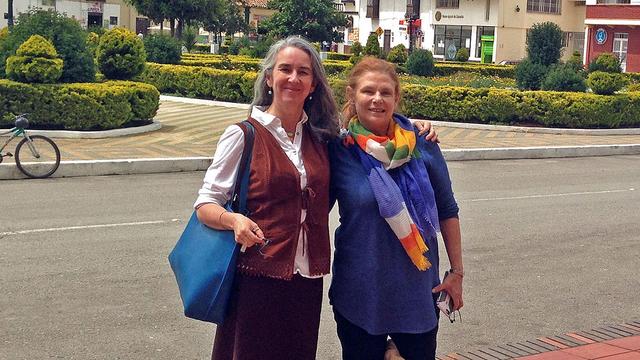What began as a research project for a faculty member at the Humphrey School of Public Affairs five years ago has become a campaign to change the laws for an entire nation.
Greta Friedemann-Sánchez, associate professor of international development at the Humphrey School, along with collaborator and attorney Margaret Grieve (MPA '16), recently published a new book, Comisarías de Familia y Violencia Contra las Mujeres en Colombia: Puerta de Acceso y Retos Institucionales (Family Commissioners and Violence Against Women in Colombia: Portal to Justice and Institutional Challenges), summarizing their extensive research on the implementation of laws intended to address intimate partner violence in Friedemann-Sánchez’s native Colombia.
They have presented their findings to various international agencies, including the United Nations and USAID. The goal, Friedemann-Sánchez says, is to convince Colombia to take the issue of intimate partner violence seriously. And that goal is within reach, thanks in part to her advocacy.
Friedemann-Sánchez spent two weeks in Colombia in August of last year and this past January, meeting with lawmakers who are drafting a new law to address the ongoing problem.
“Their proposal incorporates some of the key changes that we have been advocating for,” she says, adding that they were asked to review two drafts of the legislation, the last taking place this past week. On both occasions, the research team recommended several revisions. She expects the Colombian Congress to act on the proposed legislation this year.
Family commissioners are the key
Colombia already has robust laws on the books criminalizing intimate partner violence and providing protection for victims, says Friedemann-Sánchez. But implementation and enforcement of the laws is inconsistent throughout the country. As a result, Colombia’s rates of intimate partner violence are among the highest in the world.
This disconnect between strong laws and persistent high levels of intimate partner violence was the impetus for Friedemann-Sánchez to launch the project in 2015.
The research focused on the office of the family commissioner. Family commissioners are on the front lines helping victims of intimate partner violence by issuing civil orders of protection. Although their role is judicial in nature, family commissioners are located under mayors’ offices and funded by cities, and rarely are provided the resources they need.
“Commissioners in rural areas lack basic resources like paper, computers, printers, and internet connections, or the support personnel that is required by law,” says Friedemann-Sánchez.
They are frequently required to handle other family matters related to issues such as divorce, child custody, and child abuse. “And they are also ordered by local officials to be the transit police or manage the jail, while they’re trying to serve people who are seeking orders of protection,” she adds.
Many commissioners she interviewed say they are under tremendous stress. “Depression and burnout among these officials is a real concern.”
Friedemann-Sánchez says their research was the first to explore from the perspective of judicial providers the “flawed institutional design” of the family commissioners’ role in Colombia. Their most important recommendations include changing the institutional design by placing the office at the national level, and increasing the number of family commissioner offices according to population and services demand.
Other recommendations include providing more financial resources to the office of the family commissioners, and ensuring that commissioners throughout the country have staff such as social workers and psychologists to aid their work with victims of violence.
Impact of her work
“It’s great. It’s what you hope for,” Friedemann-Sánchez says when asked how she feels about her work having such an impact. She and Grieve went about their advocacy strategically, bringing their research to the United Nations Human Rights Council (UNHRC) in 2018 and presenting it to other international organizations that could apply pressure on Colombia to address the issue.
The most important meeting they attended was the United Nations’ Convention on the Elimination of All Forms of Discrimination Against Women (CEDAW) in February 2019, when Colombia’s CEDAW convention was under review.
“Colombia cares very much about what the world thinks about it, and the proposed new law is the result,” she says.
Friedemann-Sánchez herself spent countless hours calling, emailing, and meeting with influencers in Colombia to press for action on the issue. “It was risky because it’s taken so much time. But this is why I’m in a school of public policy—to change policy.”
Next steps in her research
The prevalence of intimate partner violence in Colombia is directly tied to its long civil war, Friedemann-Sánchez says. The government and rebel forces signed a peace agreement in late 2016 to end decades of fighting, but that did not bring peace to many women in the country.
“Colombia must recognize the link between its armed conflict and gender violence,” she says. “Men who have spent their lives fighting and using tactics of war acquire certain behaviors about how to resolve conflict and how to exercise their masculinity, which come back with them as they continue their lives at home.”
Friedemann-Sánchez plans to continue her research into this subject, thanks in part to a fellowship she will receive this fall from the University of Minnesota’s Institute for Advanced Study.
“Why do countries in conflict not harmonize their security laws? As conflict shifts from the battlefield to the home front, why does Colombia insist on keeping political and gendered security separate? That’s how I want to frame the next step in my research,” she says.
“The book is a policy document to address what is happening with the implementation of laws intended to address intimate partner violence. What I want to do now is fly higher and explore why the gaps in implementation continue to happen. It seems so obvious to me that harmonizing security is what comes next.”


